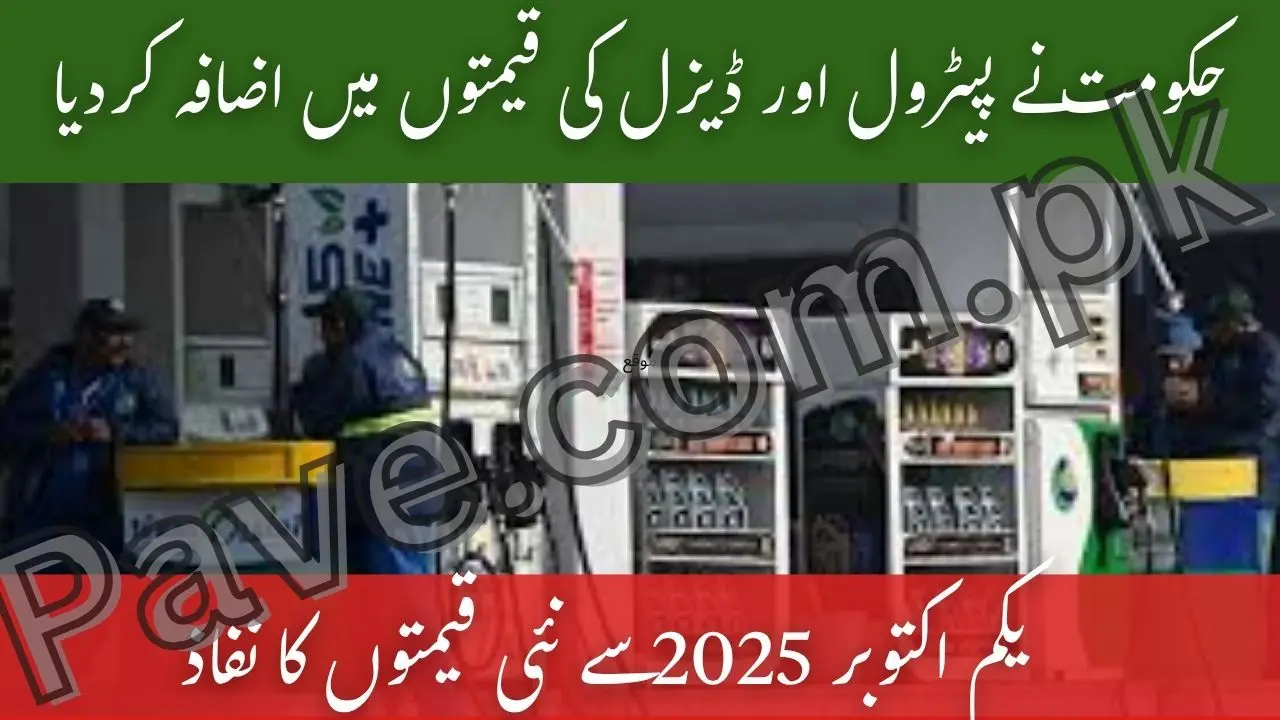Government Increases Petrol and Diesel Prices: New Rates Effective from October 1st, 2025

In a significant move, the federal Government Increases Petrol and Diesel Prices, with new rates set to take effect from October 1st, 2025. The latest price hikes, announced by the Ministry of Finance, are expected to impact millions of consumers and businesses across the country. The adjustments, made in line with global oil market trends, come as part of the government’s ongoing efforts to stabilize Pakistan’s energy sector amidst rising international oil prices and economic challenges. The new prices will remain in effect for the next 15 days
New Petrol and Diesel Rates
According to the Ministry of Finance, the price of petrol has risen by 4 rupees 7 paise per litre, setting the new price at 268 rupees 68 paise per litre. Previously, petrol was being sold at 264 rupees 61 paise per litre. Additionally, the cost of high-speed diesel (HSD) has increased by 4 rupees 4 paise per litre, which raises its price from 272 rupees 77 paise to 276 rupees 81 paise per litre.
These price hikes are attributed to the fluctuations in global oil prices and the economic challenges faced by Pakistan due to the depreciation of the Pakistani rupee against international currencies. As oil prices continue to rise in the global market, Pakistan’s import-based oil industry faces inevitable price hikes.
Read More: Balochistan Announces Electric Bikes for Women
Why the Price Hike?
The government has justified the price increase by pointing out the impact of several factors, including the surge in global oil prices, shipping costs, and the weakening value of the Pakistani rupee. Additionally, as Pakistan imports a large portion of its petroleum products, fluctuations in global prices significantly affect domestic fuel rates.
Despite the government’s efforts to manage these challenges, the hike in fuel prices was deemed necessary to balance the national budget and avoid further depletion of foreign exchange reserves. This adjustment aligns local prices with global market trends, which have experienced significant volatility in recent months.
Impact on Consumers and Businesses
The fuel price hike will undoubtedly have a broad economic impact. Consumers who rely on petrol and diesel for personal transport will experience higher travel costs, with an increase in petrol prices directly affecting commuters and private vehicle owners.
Public transport fares are also expected to rise as transport companies and drivers adjust their prices to cover the increased fuel costs. Furthermore, the agriculture and manufacturing sectors, which rely heavily on diesel-powered machinery and transportation, are also likely to face increased operational costs.
Read More: Top Electric Bikes for Families in Pakistan
“This increase in fuel prices will certainly have a knock-on effect. It’s going to be harder for people to manage their daily expenses,” said Shazia Khan, a working professional in Islamabad. Many ordinary citizens are concerned about how this increase will impact their living costs, including food and daily essentials, which rely on fuel for distribution.
The Government’s Explanation
The Ministry of Finance has explained that the price adjustment is necessary to support the economy. According to a government statement, “While the price increase may be tough on consumers, it is essential to stabilize the energy sector and align domestic fuel prices with the global market.” The government also emphasized that this adjustment is part of its broader fiscal policy aimed at reducing reliance on imported oil and managing the country’s foreign exchange reserves more effectively.
Officials further pointed out that Pakistan’s energy needs make it vulnerable to fluctuations in global oil prices, and such price adjustments are unavoidable in the current economic climate.
Possible Measures for Relief
In response to concerns about the rising cost of living, the government has suggested that it will introduce measures aimed at alleviating the burden on low-income and vulnerable communities. One such measure could be an extension of the Benazir Income Support Program (BISP), which offers financial assistance to underprivileged families.
Additionally, the government is looking into providing subsidies for sectors that are heavily impacted by the price increase, such as agriculture and transportation. These subsidies could help cushion the immediate financial impact on these industries, ensuring that essential services remain affordable for the public.
CHeck Also: PAVE Status Check How to Monitor Your Application and Bike Delivery Timeline
Encouraging Electric Vehicle Adoption
To reduce the nation’s dependence on fossil fuels, the government is also actively promoting electric vehicles (EVs) as part of its long-term strategy. The PAVE (Pakistan Accelerated Electric Vehicle) Scheme has been introduced to support the transition to cleaner, more sustainable transport options. With rising fuel costs and environmental concerns, electric vehicles present a viable alternative to traditional petrol and diesel-powered vehicles.
Under the PAVE Scheme, electric bikes, cars, and other vehicles are being offered with significant subsidies, making them more affordable for the average Pakistani. However, experts have pointed out that while the shift to electric vehicles is a step in the right direction, it will take time before EVs become a mainstream solution.
“The shift to electric vehicles is a long-term solution, but in the short term, Pakistan will still be reliant on petrol and diesel. The government needs to find ways to minimize the immediate impact of these price hikes,” said an energy expert.
Public and Economic Reactions
While the price hikes have met with public frustration, many have also recognized the necessity of the decision. “It’s unfortunate, but we have to understand that global factors are out of our control,” said Rizwan Ali, a businessman in Lahore.
The government’s explanation regarding the need for fiscal stability and energy sector reforms has resonated with some sectors of society. However, the ongoing economic challenges, including inflation and unemployment, have made it difficult for ordinary citizens to absorb these price increases.
Conclusion: What Lies Ahead?
The rise in fuel prices, while inevitable, comes at a challenging time for Pakistan’s economy, which is already struggling with high inflation, an increasing trade deficit, and a growing debt burden. While the government aims to stabilize the economy through these price hikes, it is crucial that measures are put in place to protect the most vulnerable segments of society from the negative effects.
In the coming weeks, all eyes will be on how the government balances the economic pressures of rising fuel costs with its commitment to public welfare. For now, Pakistanis will need to adjust to the new fuel prices and brace for the broader economic ripple effects.
Petrol and Diesel Price Comparison
| Fuel Type | Previous Price | New Price | Price Increase | Percentage Increase |
|---|---|---|---|---|
| Petrol (Per Litre) | 264.61 PKR | 268.68 PKR | 4.07 PKR | 1.54% |
| High-Speed Diesel (Per Litre) | 272.77 PKR | 276.81 PKR | 4.04 PKR | 1.48% |
Effective Date: October 1, 2025
Duration: 15 days from October 1







